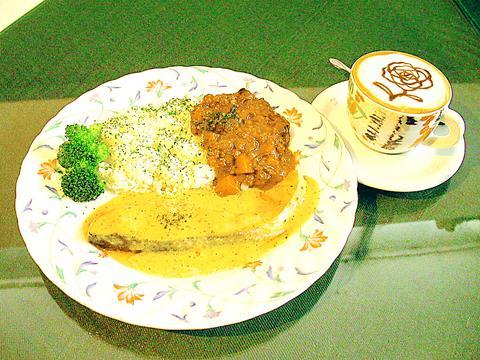La Boheme got its name from the Italian opera by Puccini. A passage describing how a flower can receive warm sunlight despite growing in an attic, says proprietor Hu Chia-yuan (
Unlike most coffee houses, La Boheme does not rely much on passing trade. But despite its out of the way location on Changan West Road, the cafe is building up a steadily clientele of genuine coffee lovers and enthusiasts of Italian cuisine. Some of them liked La Boheme's food and coffee so much that they've taken classes taught by Hu and subsequently opened their own cafes. There are also an increasing number of other establishment who simply purchase Hu's ready-made sauces and roasted coffee beans.

PHOTO: VICO LEE, TAIPEI TIMES
So that even if you've never been to La Boheme, you may have unknowingly tasted its products in other restaurants.
Hu also provides instruction on coffee making and is currently busy setting up a small factory to meet increased demand for his roasted coffee beans.
According to Hu, the secret of La Boheme's success lies in his pharmaceutical training. Although he never had any formal training as a chef, Hu experimented with many ingrediants, using the chemical properties as his guide. This knowledge helped him to bring out the best in his materials.
Salmon with clavier sauce is a popular summer dish. Like other dishes at La Boheme, it comes as a set (NT$180), with side dishes and soup. It's well worth the price as the salmon is uncommonly delicious -- hand-picked to ensure freshness and quality. To get this dish, you want to arrive early, as it sells out quickly.
The beef rib eye (NT$180 a set) is served in a northern Italian style in a strongly flavored sauce that is a blend of basamic vingar, blueberry, cheese and olive oil.
No visit to La Boheme is complete without tasting its coffee. The cafe's long coffee list has some rare blends along with the popular favorites.
Ristretto (NT$90), a kind of lightly roasted espresso bean, is just such a special variation. According to Hu, the light roasting allows the bean to retain some of the flavors -- or chemical elements, as Hu would say -- that are otherwise destroyed by heavier roasting.

Taiwan has next to no political engagement in Myanmar, either with the ruling military junta nor the dozens of armed groups who’ve in the last five years taken over around two-thirds of the nation’s territory in a sprawling, patchwork civil war. But early last month, the leader of one relatively minor Burmese revolutionary faction, General Nerdah Bomya, who is also an alleged war criminal, made a low key visit to Taipei, where he met with a member of President William Lai’s (賴清德) staff, a retired Taiwanese military official and several academics. “I feel like Taiwan is a good example of

March 2 to March 8 Gunfire rang out along the shore of the frontline island of Lieyu (烈嶼) on a foggy afternoon on March 7, 1987. By the time it was over, about 20 unarmed Vietnamese refugees — men, women, elderly and children — were dead. They were hastily buried, followed by decades of silence. Months later, opposition politicians and journalists tried to uncover what had happened, but conflicting accounts only deepened the confusion. One version suggested that government troops had mistakenly killed their own operatives attempting to return home from Vietnam. The military maintained that the

Jacques Poissant’s suffering stopped the day he asked his daughter if it would be “cowardly to ask to be helped to die.” The retired Canadian insurance adviser was 93, and “was wasting away” after a long battle with prostate cancer. “He no longer had any zest for life,” Josee Poissant said. Last year her mother made the same choice at 96 when she realized she would not be getting out of hospital. She died surrounded by her children and their partners listening to the music she loved. “She was at peace. She sang until she went to sleep.” Josee Poissant remembers it as a beautiful

Before the last section of the round-the-island railway was electrified, one old blue train still chugged back and forth between Pingtung County’s Fangliao (枋寮) and Taitung (台東) stations once a day. It was so slow, was so hot (it had no air conditioning) and covered such a short distance, that the low fare still failed to attract many riders. This relic of the past was finally retired when the South Link Line was fully electrified on Dec. 23, 2020. A wave of nostalgia surrounded the termination of the Ordinary Train service, as these train carriages had been in use for decades